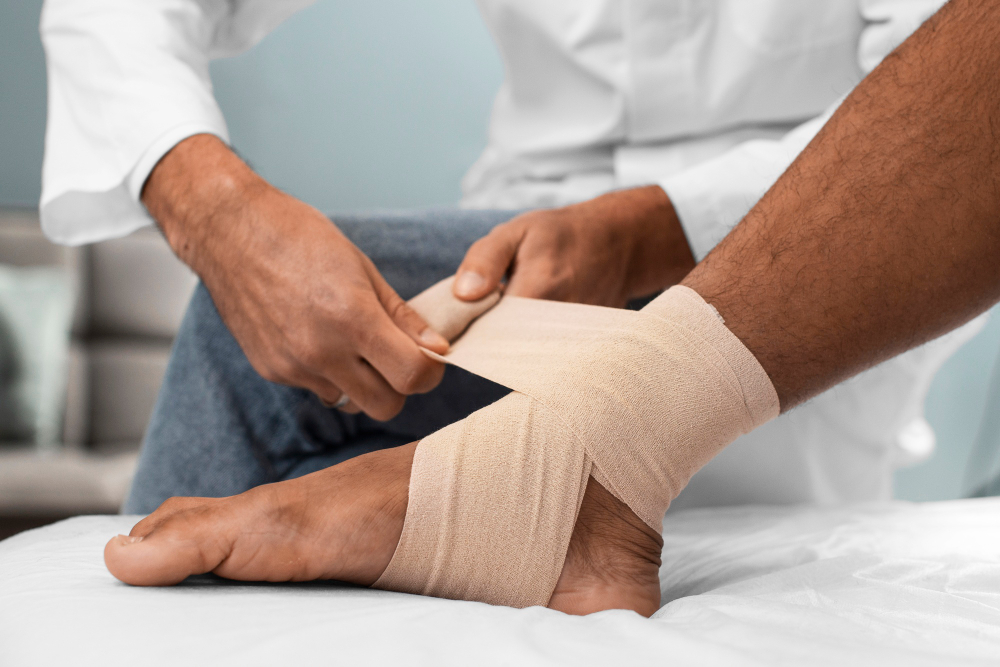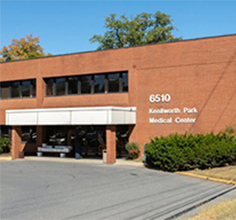
Diabetes changes the way your body heals. A small cut on the foot can turn into a serious medical issue because high blood sugar impacts circulation, immune response, and the health of your skin and nerves. Southern Maryland Medical Group can help. Patients fare much better when wound care is a part of their diabetes management. Read more to find out what to watch for, what habits help, and why it’s important to have the right care team.
Blood sugar is directly tied to how well your body can heal. When blood sugar levels stay high, they cause inflammation and damage small blood vessels, which makes it harder for oxygen and nutrients to reach the areas where they’re needed most, like a wound that’s trying to heal. Without those supplies, the healing process slows down or stops altogether. The delay opens the door for infection. Bacteria thrive in high-sugar environments, especially when the immune system is already under stress. A wound that might heal in a few days for someone without diabetes can take weeks or longer for someone whose blood sugar is out of range. Primary care doctors are usually the first to notice when wound healing is taking too long. They may recommend additional tests or treatments based on how the skin looks and how your glucose is behaving. Keeping blood sugar within target ranges gives your body a chance to repair itself. If wounds aren’t healing, it’s a sign that something in the system needs more attention.
One of the most dangerous things about wounds in diabetic patients is how subtle an infection can be at the start. Neuropathy is nerve damage caused by years of high blood sugar, and it can dull your ability to feel pain. Someone might not realize they’ve been injured until the wound is already infected. Redness, swelling, warmth, and pus are all clear warning signs. But for people with diabetes, other symptoms might be more reliable, like fatigue, a fever, or feeling “off.” If you notice a wound that isn’t getting smaller or is starting to look worse, that’s enough reason to contact your doctor. Don’t wait for obvious symptoms. If there’s a bad smell or if the skin around the wound turns black or gray, seek care immediately. These are signs of deeper infections or tissue death, both of which require medical attention. Primary care doctors in Hyattsville will usually refer patients to specialists or begin targeted treatments. Quick action can prevent serious complications, including the need for surgical interventions or amputations.
Preventing wounds, in the first place, is just as important as treating them well. A few small daily habits can support skin health and reduce risk. First, check your feet every day. Use a mirror or ask someone to help if needed. Look for cuts, blisters, redness, or anything unusual. Catching these early gives you a head start in treatment. Second, keep your skin clean and moisturized, but avoid applying lotion between your toes because moisture there can lead to fungal infections. Choose socks that keep your feet dry, and wear shoes that fit well. Avoid walking barefoot, even indoors. Small injuries from splinters or rough surfaces can be dangerous when unnoticed. Nutrition also matters. A balanced diet supports blood sugar control, which, in turn, supports healing. So does staying hydrated. Skin that is dry and cracked is more likely to break open. A small routine goes a long way in preserving the protective barrier your skin provides.
When healing stalls, or if the wound gets deeper, it’s time to get help. Wound care specialists are trained to take care of complex wounds and use techniques that help the body move forward in the healing process. Treatments can include debridement, advanced dressings, compression therapy, or hyperbaric oxygen therapy. These aren’t always needed, but when they are, they can be the turning point in recovery. Specialists also work closely with your primary care doctors and, when needed, your heart doctor since vascular health is so important for healing. Many patients who start this care earlier avoid more invasive procedures later. A specialist can also help with education, prevention, and making sure you have the right tools at home for wound care. They’ll help determine whether your footwear is appropriate, whether your nutrition supports healing, and whether there are underlying issues like poor circulation that need a closer look. If your heart doctor has mentioned vascular concerns, those should be part of the wound care conversation, too.
A single untreated wound can unravel months of good work and put you at risk for infection or hospitalization. Call or visit Southern Maryland Medical Group today. Our team of primary care doctors collaborates closely with other specialists to make sure every aspect of your health gets the attention it deserves. If you’ve had a wound that’s slow to heal or you’re not sure what to look for, we’re here to help. Call today to schedule a visit and make sure your skin is healing the way it should.
Southern Maryland Medical Group has 3 convenient locations to provide professional medical care services in the Southern Maryland area. Call or schedule an appointment with one of our locations to get medical care help.

5801 Allentown Road, Suite 400 Camp Spring, MD 20746
Phone: 301-868- 0150
Billing Inquiries: 301-552-1270
Fax: 301-868-0243

7500 Greenway Center, Dr #1200 Greenbelt, MD 20770
Phone: 301-486-7580
Billing Inquiries: 301-552-1270
Fax: 301-486-7581

6510 Kenilworth Ave, Ste 1400, Riverdale MD 20737
Phone: 301-618-0771
Billing Inquiries: 301-552-1270
Fax: 301-618-0772